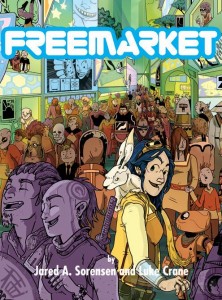As part of RyvenCon, the online gaming con, I played a quick game of Freemarket.
Freemarket’s a fascinating system and world, which I honestly had trouble wrapping my brain around. That’s not a complaint or a suggestion that either system or world are deficient; they’re just sufficiently unusual for me to feel lost on mechanics and their consequences.
Freemarket is set on a space station, in a
So, you can set up a coffee shop in your tiny living space, and make coffee for people, and do it all for free. You can operate that for years without having to spend money (there isn’t any). But hopefully, folks will appreciate your coffee by donating flow, which you can trade in for a larger space somewhere else on the station.
Back to mechanics. Character creation took about 2 hours. Characters have genelines (a family that suggests their tendencies), experiences (skills), interfaces (internal tech), technologies (physical possessions),
At the end, though, you have a
The conflict resolution mechanic involves cards, risking tokens, using cards based on tags on your abilities, and a
Each player begins with a couple of cards (based on their abilities), then draws cards each turn. Some cards give you points towards winning the conflict, while others can be used to sabotage or otherwise affect others’ cards. At any time after the first round, anyone can “call,” which ends the conflict. The cards laid out determine the winner(s), loser(s), and effects of the conflict.
This allows for a more nuanced conclusion to a conflict than “I won,” at the expense of a much more abstract, weird process. I couldn’t map the drawing of two cards on my turn to anything in the actual conflict. Granted, that’s probably part of the point.
The system and the setting fit together like a glove, and I love what I saw, but it’s clear this is not a
Thanks to Dan Clery the GM, and fellow players Ryven Cedrylle and Adam Minnie.

The card mechanic is weirdly disconnected from what happening in the fiction.
From my experience in playing through a campaign I’d disagree – Thew cards being drawn created/informed the narrative of the conflict for us. Each time a card draw or action occurred the user would give a very short narrative of what was happening based on the draw:
– Freemarket cards led to blurbs on how the environment or coincidence was helping with the challenge
– Scoring Experience/Geneline cards led to descriptions of how that trait helped, whereas those that didn’t score led to a blurb on what the character lacked and supporting would lead to calling on other skills/reserves
– Hazards, Error Correction and Tech are fairly easy to narrate
Quick clarification: users on FreeMarket don’t give you flow. That is, it’s not a currency that’s traded like money or credits or whatever. The computer running the space station awards flow based on a set of priorities in its programming.